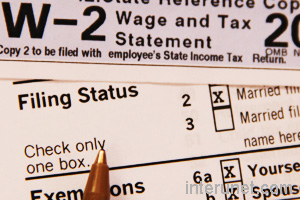
There are several filing statuses you can choose from for tax purposes, such as single, married filing jointly (MFJ), married filing separately (MFS), head of household (HOH), and qualifying widower. Some filing statuses are more advantageous over the others, but only your particular situation will determine which status you can use and not what is more beneficial to you in the certain tax year. Therefore, if you started to file as married filing jointly, you need to continue to use the same status for tax purposes from year to year until your situation will change. For example, you might get divorce, separated, widowed, or just do not want to file jointly.
In case one spouse does not know where the other one is or they lived more than last six months of the tax year separately then they may be eligible to use a single or head of household filing status depending on whether they had a qualifying child during the year. However, you must to have a proof that you really did not live with your husband/wife for more than 6 months if the IRS will ask about it.
Which filing status to use if one spouse has SSN, but other one has ITIN
The filing status rules will still stay the same regardless whether you have a valid SSN or not. It rather will depend on your marital status. Therefore, no matter whether you or your spouse have ITIN, you need to file MFJ if you were married as of the end of the tax year even if this will lower your refund. For example, in order to qualify for earn income credit (EIC) you, your spouse, and children should have valid SSNs. So, if you have a social security number and your husband does not then you won’t get the credit regardless that you worked for the whole year and you have kids.
Can I not include my spouse on my return if he has ITIN
The answer in most cases no. You should include your spouse on your return if you were married as of the end of the year. It is not ok to choose different filing statuses whatever is more beneficial to you. On the other hand, if you did not live with your husband and have different addresses with him/her then you might probably be eligible to file as single or HOH if you had qualifying dependents. If you file married filing separately it won’t do any good either because with that filing status you won’t be getting any earn income credit anyway.
What if I chose the wrong filing status
The wrong filing status may increase your tax liabilities and possibility of getting penalties and interest accordingly. Be aware that even if you receive from someone a bad tax advice it won’t release you from responsibilities anyway. That’s why it is very important to choose carefully a tax professional who will do your taxes because you are the first person who is accountable for everything what on your return is.
Always check IRS.gov for the current tax law.
